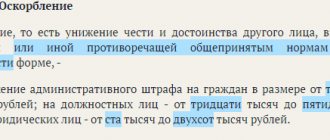Every citizen is given the right by law to protect their own interests, dignity, freedoms and rights in court.
Quite often, citizens are faced with the problem of delaying legal processes, and the main reason for this phenomenon is the lack of proper judicial notice. The opposing party in court can always delay and postpone the hearing, appealing to the lack of notification, and use the gained time for more thorough preparation for the upcoming process. There are standards that specify the procedure for issuing and serving subpoenas on citizens, but it is not possible to say that the problem has been completely resolved. As a result, quite often notifications simply do not reach the recipients, or are ignored by the latter as a document not worth attention or not mandatory for execution.
Article navigation:
Procedure for issuing an agenda
A summons is the main document that gives a citizen the right to participate in the process. The summons is served against a personal signature, and according to procedural rules, this is what the citizen must present to the court clerk on the day of the hearing.
The subpoena must indicate:
- Full name of the citizen or name of the legal entity;
- the address where the meeting will take place;
- the name of the case being examined;
- an indication as to whom the individual or legal entity is involved;
- purpose of the call.
Additionally, if necessary, the summons indicates a requirement to present evidence previously mentioned by the citizen or discovered by the lawyer.
Ways to find out information about a court hearing
From Article 3.8 of the Code of Administrative Offenses of the Russian Federation, only a judge can make a decision to deprive a driver of a driver’s license. Therefore, it is mandatory to attend court , because failure to appear will be regarded as an admission of guilt. You can find out the exact time and place where the court hearing will take place by contacting the traffic police.
In any case, the offender will be sent a summons , which will contain all the necessary information, but due to errors in the mail or other force majeure situations, it may simply not reach the addressee.
Disqualification cases are dealt with by Magistrates located in the area where the crime was committed. But the offender has the right to file a petition in which to ask to transfer the case to the court at the place of actual residence.
Also, if the judge makes a decision not in favor of the driver, then he has the right to ask for a review of the case in the district court. If an unsatisfactory decision is made there, then you can file a complaint one step higher. This way you can reach the Supreme Court.
also find out the time of the trial via the Internet on the official website. To do this, you need to know the name and surname of the judge who will hear the driver’s case.
If the consideration of the case drags on and one meeting is not enough, then another one will be scheduled.
Sample subpoena
If the person brought to court is absent, is away, or is not at home for any other reason, the summons must indicate the full name of the person who is notified of the need to hand over the document to the citizen summoned to court in person.
How can I find out when the meeting will take place?
The traffic police inspector transfers all materials on the case to the court within three days, according to Art. 28.8 Code of Administrative Offences. How can a driver find out how many days after the violation the trial will occur? There are two options to find out the exact date and time of the future meeting:
- Wait for the court to send an official summons.
According to Russian law, the offender must be notified of the place and time of the trial. This must be done in such a way that there is a signature confirming personal receipt of the notice.The summons arrives within one month from the date of registration of the protocol, based on an administrative offense. Despite this legal obligation to notify the driver when the court will be held, the summons may not arrive. You should not hope that the case was forgotten or closed after the statute of limitations expired. Such cases occur very rarely. But the violator risks missing the hearing and the court decision will be made without his presence.
This way it will not be possible to protect the interests of the driver. And appealing the actions of executive bodies can take a lot of time.
- Find out in person what date the trial is scheduled for.
To do this, you need to determine in which judicial branch the proceedings will take place. If the protocol did not include a request to consider the court case at the place of registration, it is necessary to look for a court department near the place where the protocol on the fact of an administrative violation was drawn up.If you have any doubts, you should contact the traffic police and find out more precisely the information about the court site.
The next step is a telephone call to the magistrate's court department. You need to find out whether a date has been set for the consideration of the case by indicating your personal data. After this, you can go to court yourself to receive a summons. This is not necessary, but having an official document in hand will make you feel much calmer.
Methods of serving a subpoena
Initially, a subpoena is intended to notify of the date of the hearing, and thus guarantee the presence of a participant in the hearing, be it a defendant, a witness representing any party, or a plaintiff. Summons sent to citizens participating in the trial must be properly executed and transmitted in any way provided for by law.
The summons is issued after the plaintiff submits an application to the court, its preliminary consideration and the setting of a hearing date.
Subpoenas may be sent as follows:
- by mail, indicating the address of the court where the hearing is taking place;
- by an authorized person in the hands of the addressee, under a personal signature;
- a telegram, which the postman hands over to the addressee and receives his signature on the form;
- by fax, with return confirmation of receipt of the summons;
- telephone message, also with confirmation of receipt;
- by e-mail, attaching the transmitted contents of the document, with the obligatory indication of the person who sent the letter, the date and exact time of mailing, and the initials and surname of the person who received the notification;
- by sending a fax notification, attaching an exact copy of the transmitted text, indicating the persons who sent and received the notification, as well as the exact date of transmission and time.
All participants in the process are notified of the upcoming hearing in advance, and according to the law, are required to attend the process, unless there are valid reasons that need to be notified to the court and confirmed with documents.
Called as a witness and what happens if you don’t show up?
The law is structured in such a way that witnesses are the most significant participants in the process and without their testimony, a criminal or civil case can be considered from different angles, and here the court always warns witnesses who appear in court about criminal liability for giving false testimony and I want to note that the plaintiff and defendant there are no warnings about criminal liability, so I think it is now clear that for a correct and fair decision by the court, it is desirable that there be witnesses in the case, and preferably more than one. However, if you have received a summons for a criminal case, and the person who is being accused is not at all familiar to you, then it is better not to refuse to go to court, since in this case you may be forcibly brought to court.
We can talk for a long time about subpoenas, letters, correct notifications, but the main thing here is the timing of notifications and your control. If you don’t know what to do, then write to me and we’ll think about what to do, since everyone has their own case and it is individual and do not delay in resolving the issue in civil and especially criminal cases. Sincerely, Your Law
Great article 0
What is the reason for not appearing in court?
There is no clear list of valid reasons for failure to appear in court. The reason for absence from a hearing is considered valid if it is based on the principle of physical impossibility to come to court.
Valid reasons for failure to appear in court:
- health condition that makes it impossible to move;
- death or illness of a close relative;
- lack of notification;
- notification in violation of the established procedural procedure (method, deadlines, etc.);
- force majeure circumstances beyond a person’s control and affecting the ability to attend court (fire in a house, accident, traffic accident);
- long business trip;
- prolonged absence from the place of stay for other reasons (military training, caring for a sick relative in another city).
Any of the reasons must be documented; oral evidence is not enough.
If you know in advance that you will not be able to attend the meeting, you can notify the judicial authority in advance. To do this, you need to file a petition with the court asking to postpone the court hearing, indicating the reasons why this is necessary. You can also ask for the case to be considered in your absence, in cases where this is acceptable to you.
Judged in absentia
Quite often, courts consider claims in the absence of one or both parties to the dispute, and in their decisions they write that they “properly notified” the citizens, but for some reason they did not come to the hearing. At the same time, the courts completely abdicate responsibility for failure to inform the parties to the dispute, turning the tables on the post office, saying that it does not work well. Although in reality, as the situation considered by the Supreme Court showed, the post office fulfilled its obligations to the citizen. Needless to say, the absence of one of the parties in court actually makes the process easier, saves time, but is an illegal way to make the work of court officials easier.
In its ruling in a civil case, the Supreme Court explained the procedure for notifying a person about a future meeting. This may be useful for those in a similar situation. The essence of the case in which the citizen reached the Supreme Court is simple - he was not invited to the court hearing, his arguments were not listened to, and the case was considered in his absence. But the citizen’s legal demands were denied.
Our hero turned out to be a plaintiff in a civil dispute. It was about a loan that one Volgograd family received to purchase finished housing. The bank approved the loan, we bought a house, but our plaintiff began to repay the loan to the bank for the recipients of the money.
However, at some stage, the plaintiff stopped paying off someone else’s loan and went to court so that those citizens who actually received a loan from the bank would return the amount paid to the bank.
The Volgograd District Court confirmed that legally the plaintiff has nothing to do with the loan - he is neither a borrower nor a guarantor. He paid money to the bank for the defendants voluntarily. At that time he did not make any demands for the money to be returned to him and was well aware that he had no obligations to the recipient of the loan. Based on this wording, the court rejected the citizen’s claim. The appeal in the regional court agreed with these arguments. But the Judicial Collegium for Civil Cases of the Supreme Court did not agree.
The absence of one of the parties from court is an illegal way to facilitate the work of court officials
The Supreme Court began by reminding its colleagues about the Constitution and its 123rd article. This article says that legal proceedings in our country are carried out on the basis of equality and competition of the parties.
And the Civil Procedure Code (Article 155) states that the trial of a civil case in court must take place with mandatory notification of the time and place of the meeting to everyone who participates in the process.
And in the same code, but in another article - 113th - it is said that citizens participating in the process are summoned to court by registered mail with receipt of receipt, a subpoena with the same notification of delivery, telephone message or telegram, or by other means. delivery means “ensuring the recording of a judicial notice and its delivery to the addressee.” A message by law will be considered delivered if it reaches the addressee, but due to circumstances depending on this addressee, the paper was not handed to him and he did not familiarize himself with it. Simply put: the summons arrived, the citizen was informed about it, but he did not come to the post office on purpose.
In our case, judging by the notice from the Central District Court of Volgograd, the consideration of the citizen’s complaint in the regional court was scheduled for July 8 last year at 9.30 am. This meeting took place, and the regional court rejected the citizen’s claim, just as he was rejected in the district court. The minutes of the court session record that the applicant was notified of the hearing as required, but he did not appear, and the court decided everything without him.
In response to this statement, the Supreme Court noted: there is no information in the case that the citizen was promptly served with notice of the time and date of the trial. The person was given notice that the trial would take place on July 8 on July 11. And the post office is not to blame, since, judging by its stamp, the letter from the court arrived at the post office on July 9, that is, the day after the trial.
Therefore, the Supreme Court stated that inadequate notice prevented the citizen from exercising his legal right to present evidence. And this violated human procedural rights.
Therefore, the Supreme Court, having overturned the previous decision, ordered that the person be properly notified and the case reconsidered.
Liability for failure to appear in court
Responsibility and consequences for evading attendance at a meeting depend on who you are called as (plaintiff, defendant or witness), and on the type of case being considered (criminal, administrative or civil).
Possible consequences of failure to appear in court:
- the court will make a decision in your absence;
- the court hearing will be postponed;
- you will be fined up to 2,500 rubles;
- the person summoned may be escorted to the courtroom by bailiffs or police officers;
- If you deliberately avoid giving evidence, a criminal case may be opened against you.
It is worth noting that, firstly, by ignoring a subpoena you are showing contempt of court. Secondly, you deprive yourself of the opportunity to be heard. Remember that your words and presence can greatly influence the outcome of the trial. This is extremely important if the claim directly affects you.
If you receive a subpoena, do not be afraid or panic. Avoiding your trial may cause you more problems than your participation in it.
Want to share?
How to find out the court decision and get a copy of it
After 30 days from the date of adoption in the courtroom, the decision begins to take effect.
The judge's decision is announced by the judge himself at the end of the hearing. It can also be clarified on the website of the court in which the case was heard. There is also the opportunity to go to the State Road Inspectorate. The judge's report is also kept there. The first method is much simpler than the second.
Expert opinion
Ivan Strahovsky
Insurance expert
OSAGO calculator
To do this, you just need to log in to the official traffic police resource, select your region, go through two tabs (“ Services ” and “ Driver Check ”), and then simply enter all the required information. You can find the latest information on the website.
You can also use two other methods: contact the nearest traffic police station, or send a letter with a corresponding request to the Road Inspectorate.
What happens in case of no-show
Part 2, Article 25.1 of the Code of Administrative Offenses of the Russian Federation establishes the possibility of considering a case and making a decision by the court in the absence of the defendant only if the offender was properly notified or filed a petition to postpone the consideration of the case to another date or this petition was not granted by the court. It turns out that if the defendant was untimely notified by the court of the date and place of the trial, then he has the right to appeal the court decision made without his presence.
In practice, there are often cases when persons who are participants in administrative proceedings are not informed in a timely manner about the upcoming court hearing. For example, if:
- postal service workers did not deliver the registered letter in a timely manner;
- the offender did not indicate the exact address of his residence in the protocol drawn up by the traffic police officer;
- Judicial officials make a mistake when indicating the offender’s residential address, and the summons is sent to the incorrect address.
There are also situations where drivers deliberately leave the city to avoid receiving a court notice. In such circumstances, the offender may face certain adverse consequences. For example:
- the court can consider the case without the presence of the offender;
- the court will most likely accept an act of deprivation of the right to drive a vehicle, since the motorist is deprived of the opportunity to provide evidence indicating his innocence;
- the defendant is deprived of the opportunity to appeal the court decision if he was properly notified by the court;
- the court may make a decision to impose a fine on the driver instead of depriving him of the right to drive a car.
If the driver was not properly notified, and the court has already adopted an act of deprivation of driving a vehicle, then the motorist will be able to return the seized driver's license by appealing the court act on appeal within 10 days after he learned or should have learned about such court decision.
How and where can I find out the date of the court hearing?
There are several existing resources that publish information about court decisions relating to both criminal, administrative and civil cases. We recommend using official sources, in which case you will be confident in the veracity of the published information.
Official sources include:
- GAS "Justice".
- Official website of the RF Armed Forces.
- Service "Court decisions".
- Internet resource with Judicial and regulatory acts of the Russian Federation.
- Internet resources of regional courts.
- CAD service "My Arbitrator".
A more preferable option is the State Automated System “Justice”, where you can find the decision of any court existing on the territory of the Russian Federation. In addition, the resource has a clear interface, a well-thought-out system of use and quick response. On the site you can filter cases by name of the court, specific court and other parameters.
What data will be needed
The more information you have, the easier it will be to know when your case is scheduled to be heard. Court workers moved their work to electronic format many years ago. Now the system has been worked out and adjusted, the date of the hearing will be entered into the register immediately after the appointment.
If you know the case number, go to the section with judicial records management and simply read the current schedule on the State Automated System “Justice”.
In addition, you can search if you have the following information:
- the names of one of the participants in the proceedings;
- approximate or exact date of receipt;
- commencement of proceedings in court;
- case category;
- surname, given name of the judge;
- order number;
- decision on the case;
- dates of the case.
Payment to an employee for absence due to a court summons
Who pays, how absences due to a summons are paid, and what documents need to be presented for this are of concern to most people who receive such notices. Let's look at this issue in more detail.
An employee who has received an invitation to court is relieved of his direct duties for the duration of the meeting in accordance with Article 170 of the Labor Code of the Russian Federation.
According to this article, the employer is obliged to preserve the employee’s workplace. The state body is responsible for maintaining the employee’s average earnings during this time. However, such compensation is intended for persons who were summoned to court as a witness, expert, specialist, translator, victim or witness.
The table shows the compensation that an employee can receive if summoned to court.
| Privileges when receiving a subpoena | Who provides | Confirmation document |
| Release from direct duties | employer | agenda |
| Maintaining average earnings for the duration of the meeting | civil service | certificate of income from place of work |
| Payment for travel documents if the trial took place in another city | civil service | travel tickets |
How to behave if it comes to drinking and driving?
- Try to look as decent as possible. You must arrive at the court hearing on time, without being late.
- You must have paper and all writing materials with you. You need to prepare documents in advance, in particular, a written explanation of the case, which is drawn up in 2 copies. You will also need to ask the court to consider this explanation.
When defending your rights in court, you need to behave calmly . You must answer the questions asked while standing and do so confidently. When addressing a judge, say “dear court” or “Your honor.”
You shouldn’t rejoice at the judge’s positive attitude in advance. It probably has nothing to do with what the defendant is saying. It is necessary to follow a clear position stated in written explanations.
At the beginning of the trial, the judge must explain the rights that the defendant has. After this, it is clarified whether the defendant has any petitions. At this time, you need to submit a petition in order to consider, together with other materials, the offender’s written explanation on the merits of the case (you can find out how to write a petition not to deprive a driver’s license, and also see a sample request to the court and the traffic police here).
After service of this document, if accepted by the court, the defendant must speak and state his case. To do this, you can read written explanations or express your thoughts in free form. The judge may ask many different questions regarding the case materials . You need to try to answer them slowly and calmly.
Gradually, the defendant must provide everything that proves his innocence, paying special attention to procedural errors by traffic police officers.
It is necessary to take the initiative and gradually prove that the version of the accusing party is not justified. This tactic is very often successful. When filing a petition with a judge, you should not rush, but give him time to calmly study and make a decision. The accusing party most often bases its tactics on the testimony of traffic police officers who act as witnesses at the court hearing. When the defendant interrogates them as witnesses, you need to be assertive and draw the judge’s attention to the violations committed by the inspector. It is important to prove that the inspector's testimony does not correspond to the case materials .
The main task is to prove that you are right and that the prosecution’s version is unfounded. Do not hesitate to demand details from the accusing party on all documents that are used to support the accusation.
If there is documentation in the court case that shows signs of significant inaccuracies or corrections, you should definitely focus on this. You can insist that such documentation be excluded from the case materials used by the judge on the grounds of illegality. It is necessary to do everything possible to shake the position of the traffic police during interrogation, to give detailed answers to the court’s questions. The court should be asked to call and question witnesses who acted as witnesses .
How does the trial work?
The trial includes the following procedure:
- the car owner states his position on the case under consideration;
- the offender answers the court's questions;
- after the defendant the traffic police officer speaks;
- the traffic police officer answers the court’s clarifying questions, as well as the defendant’s questions;
- after the parties, witnesses in this case begin to testify;
- After considering the testimony of witnesses and studying the evidence, the court makes an appropriate decision.
Attention! It is necessary to take into account that the court must make a decision on deprivation of the right to drive a vehicle within 12 months, since after the expiration of the specified period the car owner cannot be deprived of the right to drive a car.
After considering a case of deprivation of a driver’s license for alcohol, the court may also issue an act in favor of the defendant if the traffic police inspector made serious mistakes, for example:
- no witnesses were present when the protocol was drawn up;
- the protocol was completed with errors;
- if the best man did not sign in the protocol indicating familiarization with Article 51 of the Constitution of the Russian Federation;
- the motorist was not familiar with the procedure for conducting a medical examination.
After the judicial act enters into legal force (the act comes into force within 10 days after its adoption), within 3 days the motorist is obliged, along with the decision, to issue a certificate to the traffic police.
Important! If the driver has lost the court order, he should file a petition for a duplicate of this document. Since he can only surrender his license to the authorized body, and the period of deprivation of his driving license will be calculated from the day the driver’s license is presented to the traffic police.










